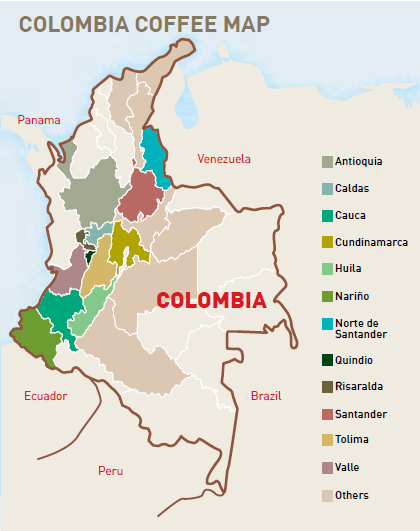Colombian Coffee Facts

Colombian coffee is arguably the most famous and delicious, and Planet Coffee has Colombian Supremo beans in its office coffee offering. What is Colombian coffee? And what makes it one of the top choices when it comes to tasty coffee beans? Let’s explore Colombian coffee beans in this blog.
Colombian Coffee Facts
Colombia is in the coffee bean growing belt as you can see in this picture.

Colombia is currently the #3 top exporter of coffee in the world (after Brazil and Vietnam). The country exports approximately 11,000,000 bags of coffee each year. Why is Colombian coffee the world’s favorite? There are 3 big reasons:
- Colombia has the ideal geography for coffee production. Their coffee is known for its rich, mild flavor that comes from the perfect climate and elevation. As you may have heard before, coffee grows best in volcanic soil, at 1,200-1,800 meter elevation, in places that are free of frost but receive around 80 inches (200 cm) of rain a year. Colombia ticks all those boxes.
 Colombia basically has a bean to suit every taste. As you can see in the picture, Colombia has wide growing areas that run from north to south, producing different bean flavors. For example, the northern region that includes Norte de Santander, Santander, and ‘Others” is warmer and lower altitude and produces coffee that has lower acidity and a fuller body. Central region including Antioquia, Cundinamarca, and the north of Tolima harvests all year round. Finally, the beans from the southern part of the country (Nariño, Cauca, Huila and the south of Tolima grow at higher altitudes, closer to the equator, giving them a higher acidity and much sought-after sweetness. What’s all this mean? The taste of coffee is subjective, and you will definitely find exceptional coffee that you’ll love.
Colombia basically has a bean to suit every taste. As you can see in the picture, Colombia has wide growing areas that run from north to south, producing different bean flavors. For example, the northern region that includes Norte de Santander, Santander, and ‘Others” is warmer and lower altitude and produces coffee that has lower acidity and a fuller body. Central region including Antioquia, Cundinamarca, and the north of Tolima harvests all year round. Finally, the beans from the southern part of the country (Nariño, Cauca, Huila and the south of Tolima grow at higher altitudes, closer to the equator, giving them a higher acidity and much sought-after sweetness. What’s all this mean? The taste of coffee is subjective, and you will definitely find exceptional coffee that you’ll love.- The whole country is behind coffee production. There are more than 500,000 families that produce coffee in Colombia, and they are in a well-organized trade association that is focused on making sure these families have good working conditions, improved infrastructure, and social security. And because it’s all family-owned business, these coffee growers pour a lot of love into what they do.
Good Coffee and Bad Coffee from Colombia
The subheading may shock you because up until this point, we pretty much established that Colombian coffee is the world’s favorite. However, you should know that there are good ones and bad ones, just as there are different qualities and grades of rye grains for animals. Colombia produces a vast variety of coffee bean types with different qualities, so Colombian coffee is not synonymous with quality! Here is a big reason why we can state so.
Coffee Farm Systems
Small farms: There are said to be over 300,000 small coffee farms in Colombia. These small farms are about 1-2 hectares in size and don’t produce enough coffee for a consistent annual harvest. These farms sell their beans to coffee merchants, and the merchants often blend coffee beans from each farm.
Mega farms: On the opposite side of the scale are the ‘mega farms’, which are about 100-300,000 hectares in size each. They have their own contracts with exporters, but because of their contractual obligations they have sold their idea on a certain ‘taste’. This means that they must always produce beans to the particular ‘taste’ that they agreed upon in their original contract. These types of coffee beans may not be the exceptional coffee you would expect from Colombia, but this is the reality when it comes to coffee farm systems in the country.
Please feel free to ask us about the origin of the Colombian coffee beans we carry. We have them in whole beans, decaf, and even organic ones. You can have the utmost confidence that when you use office coffee services from Planet Coffee, you will always have exceptional Colombian coffee coffee!

